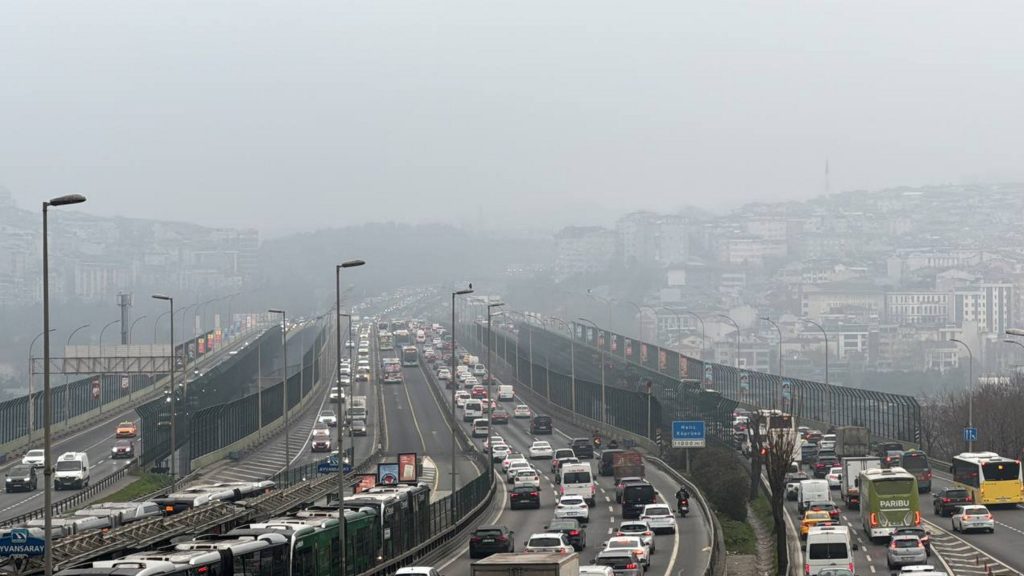Istanbul has overtaken New York to claim the title of the world’s most congested city, according to a 2024 report published by a U.S.-based software company. As the city’s population grows, so does the number of motor vehicles on its roads, exacerbating traffic, polluting the air and even altering weather patterns.
Professor Hüseyin Toros, a faculty member at Istanbul Technical University’s (ITÜ) Climate Science and Meteorological Engineering Department, highlighted these pressing concerns.
Professor Toros explained that the growing number of vehicles in Istanbul, now nearing 6 million, according to Turkish Statistical Institute (TurkStat) data, has far-reaching consequences. “This is a massive number,” he said.
“In Istanbul, a journey that should take 30 minutes often takes one-two hours. A vehicle that would normally operate for 30 minutes instead runs for double or even triple that time. This significantly increases emissions.”
The impact of traffic congestion on air quality is stark. Professor Toros explained that frequent stop-and-go traffic contributes to higher emissions. “The more a vehicle stops and starts, the more pollutants it releases into the atmosphere. Exhaust fumes and particles from brakes, pads and tires are major contributors to this pollution.”
“When we combine all these factors, the rising traffic in Istanbul is increasing the concentration of pollutants such as particulate matter and carbon monoxide in the air,” he said.
These pollutants don’t just affect the environment; they have dire implications for human health. Professor Toros emphasized that air pollution is a silent killer. “Air is the most consumed substance by the human body. When air quality declines, we inhale more polluted air, negatively impacting our health.”
According to the World Health Organization (WHO), over 7 million people die each year due to poor air quality. Polluted air can cause severe health problems, from lung damage to issues affecting the brain through the cardiovascular system.
Long-term solutions for air quality
Reducing air pollution in Istanbul is an uphill battle; Professor Toros pointed out that while pollution levels had dropped since the 1990s when three-digit figures were common, current levels are still far from the ideal single-digit range. “We need to rethink how we use vehicles and reduce stop-and-go traffic to achieve further reductions. However, with the number of vehicles increasing daily, this is becoming increasingly difficult,” he warned.
Long-term solutions include transitioning to public transportation and shared vehicle systems. “Short-term measures, such as raising awareness about efficient vehicle use through media campaigns, can also help. If we continue to see vehicle numbers rise, congestion will worsen, causing more delays and increasing pollution,” he said.
One of the more surprising effects of Istanbul’s traffic crisis is its potential to impact snowfall. Professor Toros explained that urbanization and traffic have transformed Istanbul’s landscape, creating what he described as an “urban heat island.”
“Every vehicle in Istanbul acts like a stove, releasing heat and pollutants into the atmosphere. These pollutants mix into the air and alter its chemical composition. Urban surfaces, such as asphalt, trap more heat, causing temperatures in the city to rise,” he said.
This phenomenon can prevent snowfall, even when conditions are otherwise favorable. “For snowfall, temperatures must be at or below 0 degrees Celsius (32 degrees Fahrenheit). However, in central Istanbul, the urban heat island effect can raise temperatures by 2 degrees Celsius. If the number of vehicles was lower, temperatures might drop to 0 degrees Celsius, allowing snow to fall instead of rain,” he explained.
The health implications of Istanbul’s traffic-induced air pollution are severe. Professor Toros highlighted that pollutants released into the atmosphere by vehicles directly harm human health and contribute to global climate change.
“The polluted air we breathe affects our lungs, heart and brain. Reducing vehicle emissions is not just about improving air quality; it’s about protecting public health,” he stressed.
Urban planning is another critical factor. The transformation of Istanbul’s landscape, with increasing asphalt surfaces and diminishing green areas, intensifies the urban heat island effect. This not only impacts snowfall but also exacerbates the city’s already high temperatures during the summer months.
Toros called on Istanbul’s residents to adopt more sustainable habits. “In large cities like Istanbul, using public transportation or moving closer to workplaces can significantly reduce emissions. Public awareness campaigns about energy-efficient driving can also make a difference. If we don’t act now, the consequences will be severe: longer traffic delays, poorer air quality, and greater health risks.”


